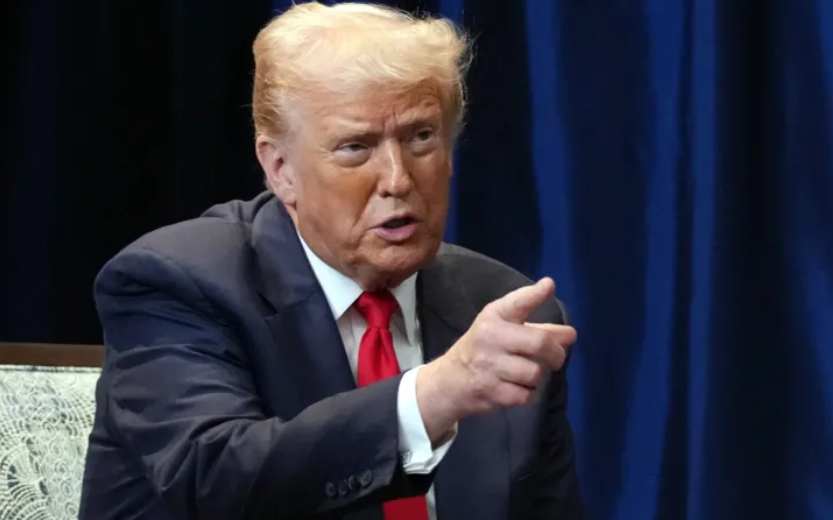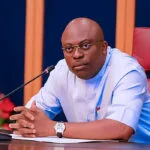The threat, the other day, by the US President Donald Trump, of the possibility of a military intervention in Nigeria to flush out jihadist bandits and terrorists killing Christians across Northern Nigeria has jolted both the government and Nigerians alike. The threat is avoidable, in the first place, if the successive governments in the country since 2009, when the insurgency started, had demonstrated enough commitment and sincerity to tackle the problem. Trump’s threat represents a turning point in the intractable problem of mass killings perpetrated by Boko Haram, ISWAP, Ansaru and sundry Islamic Jihadist groups operating in Northern Nigeria.
The US threat followed the recent designation of Nigeria as a Country of Particular Concern (CPC), by President Trump. The CPC designation has serious implications, which may confront Nigeria. As a matter of fact, Nigeria was first designated as a CPC by President Trump in December 2020 during his first term, citing severe violations of religious freedom. The designation was later lifted by President Joe Biden, but rather than take steps to address the thorny issue of worsening insecurity resulting in deaths of innocent citizens and blatant persecutions, the government apparently swept the matter under the carpet and assumed that the matter was over.
Between 2020 and 2025, when Trump came back to power, the religious persecution appeared to worsen rather than abating. The Nigeria government was aware of the deteriorating situation, but in its usual manner, rather than addressing the situation, it kept on denying it. Denial is the hallmark of the government. It denies every negative report from international organizations about Nigeria.
Without doubt, when Nigeria was first designated by Trump as a CPC in 2020, the government must have denied it, or at best attributed it as the handiwork of the opposition and did nothing about it. Then came the removal of Nigeria from the CPC designation, by President Joe Biden, which would have bolstered Nigeria’s government believe that all is well, hence, it packed the matter by the corner and went to sleep.
The latest designation of Nigeria as a CPC did not come like thunder bolt, it followed a process over time. Can the Nigerian government say it did not know something was cooking against it? Why did the government not do something to nip the CPC designation in the bud? What happened to Intel gathering of the government?
When Ted Cruz, an American senator, declared that Nigeria’s government was enabling a “massacre” of Christians, it was loud and clear as the world took notice of it. The fact that it was coming under Trump again ought to have gingered the government to wake up. Ted Cruz’s claim was shared on social media and repeated in congress. It accused the Nigerian authorities of ignoring what he called “Christian genocide”.
Buttressing with data, Cruz citied that “50,000 Christians have been killed since 2009, 2000 schools and 18,000 churches destroyed” Cruz wrote on X. “The Nigerian government has looked the other way, he added. Working with Cruz were some Nigerian activists in the US who backed Cruz with data.
Like fire, Cruz’s word had an impact – within days, US President Donald Trump re-designated Nigeria as a Country of Particular Concern, a label reserved for governments accused of tolerating religious persecution.
Trump warned that America could “stop all aid and assistance to Nigeria” and “go in gun-a-blazing” if the killing continues. Back home in Nigeria, President Bola Tinubu dismissed the allegations as “unfounded and misleading, “saying that Nigeria will not accept lectures from those who seek to profit from our divisions.
The FCT Minister, Nyesom Wike, on his own, blamed the opposition for the claims that Christians were being killed in Nigeria. Speaking as a guest on Channel’s Television Politics Today, he described the move as “politics too far”. He stressed that the opposition was fueling the narrative of a Christian genocide without mentioning any particular opposition party.
Similarly, the Chief of Defence Staff, General Olufemi Oluyede, debunked allegations of widespread persecution of Christians in Nigeria, stressing that the nation’s primary security concern remains terrorism. He rejected Trump’s assertion that Islamic extremists were systematically attacking Christians in the country. “There are no Christians being persecuted in Nigeria. We are facing insecurity, especially terrorism, and it’s something that has been affecting Nigeria for quite some time now!!
But on a more serious note, former Governor of Anambra State and 2023 Labour Party presidential candidate, Peter Obi, expressed deep concern over the United States government recent designation of Nigeria as a Country of Particular Concern, with possibility of military intervention in response. According to Obi, the development should “give every well meaning Nigerian serious concern, noting that the nation is facing “unprecedented level of insecurity”, marked by loss of lives and property on a disturbing scale. He blamed Tinubu’s incompetence, saying that effective leadership could have averted the killings.
Speaking in the same vein, Human Right Lawyer, Ifeanyi Ejiofor, called on the Nigerian government not to disregard the threat by US President Trump. He said this should not be dismissed as a mere rhetorical flourish, but rather understood as a diplomatic thunderclap capable of triggering serious international repercussions.
The problem with Nigeria on the CPC designation is that the government is on denial of the allegation. Whereas, President Tinubu dismissed it as unfounded and misleading, the Chief of Defense Staff bluntly said there are no Christians being persecuted in Nigeria. Nysom Wke, reacting, blamed the opposition. As it were, no arm of the government has accepted that what America is saying is true.
The first step towards solving a problem is to accept that there is a problem. Once a problem is recognized to exist, the next step is to seek for solution. So long as Nigeria does not accept that there is Christian genocide in the country that may explain why the government has not taken adequate steps to address the problem. That in effect may explain why nothing was done to dissuade America from designating Nigeria as CPC.
As a super power, America pursues it international policy objectives worldwide without miss. Senator Cruz, the arrow head of Nigeria’s CPC designation is a dogged fighter on matters of his faith. He describes himself as a defender of religious freedom worldwide. It is that conviction that has drawn him into Nigeria’s security crises.
The problem escalated to the present level because Nigeria kept denying the allegation. Otherwise, why did Nigeria keep quiet and did nothing while the process of designation was on? The issue of whether or not Nigeria accepts it requires diplomatic engagement, which Nigeria cannot do at the moment because there is no ambassador in Washington. The presence of an ambassador could have averted this trouble.
Since September 2023, when President Tinubu recalled all ambassadors and high commissioners, with a promise to reposition Nigeria’s foreign service for greater efficiency, more than two years later, the replacements have yet to be done. It is heartening to hear this morning that Tinubu has finally released the list of ambassadors, apparently in repose to Trump’s threat. That is a good starting point, though belated. Nigeria needs vibrant diplomatic fireworks to mitigate Trump’s threat. Otherwise, the havoc done by over two years of diplomatic vacuum could spell untold crises for Nigeria if Trump goes ahead to effect his threat.
Dr. Onyekakeyah, a former member of Thhe Guardian Editorial Board, is a public affairs commentator and a Daily Query columnist.


























